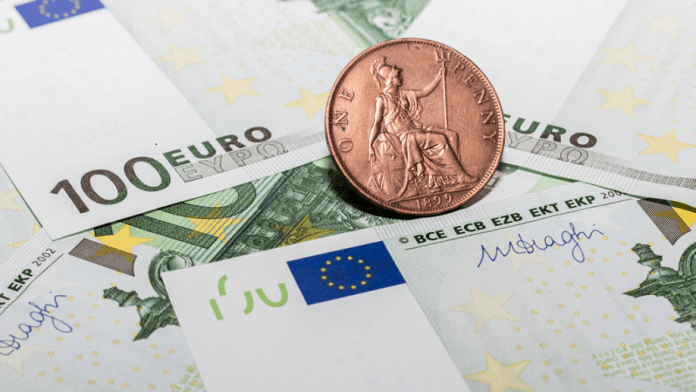The pound-euro exchange rate closed the session at roughly the same level that it started the session on Thursday. Whilst Brexit uncertainties continued to drag the pound lower, concerns over the European Central Bank’s ability to raise interest rates weighed on the euro.
| What do these figures mean? |
|---|
| When measuring the value of a pair of currencies, one set equals 1 unit and the other shows the current equivalent. As the market moves, the amount will vary from minute to minute.h If the euro amount increases in this pairing, it’s positive for the pound. Or, if you were looking at it the other way around:1 EUR = 0.87271 GBPIn this example, €1 is equivalent to approximately £0.87. This measures the euro’s worth versus the British pound. If the sterling number gets larger, it’s good news for the euro. |
The pound was out of favour as Brexit dominated headlines. Japanese Prime Minister Shinzo Abe met with UK Prime Minister Theresa May in the previous session and publicly expressed Japan’s desire, that the UK avoided a no deal Brexit. Mr Abe’s support is unlikely to help Theresa May’s deal across the line.
Should Parliament not support Theresa May’s deal, there is a chance that the UK could crash out of the EU without a deal. This remains the default option, even though a majority in Parliament supported a motion which is designed to reduce the probability of a no deal Brexit.
Today the Brexit debate continues in Parliament. However, the UK economic calendar is fuller providing some distraction to investors. Analysts are expecting manufacturing and industrial production to have declined by less in November than in October. Analysts are predicting that UK GDP will have increased by just 0.3% in the three months to November, down from 0.4%. The weaker reading could dent already fragile support for the pound.
| Why does poor economic data drag on a country’s currency? |
|---|
| Slowing economic indicators point to a slowing economy. Weak economies have weaker currencies because institutions look to reduce investments in countries where growth prospects are low and then transfer money to countries with higher growth prospects. These institutions sell out of their investment and the local currency, thus increasing supply of the currency and pushing down the money’s worth. So, when a country or region has poor economic news, the value of the currency tends to fall. |
Doubts Raised Over ECB Hiking Later In The Year
The euro was also out of favour in the previous session following the release of the minutes from the latest European Central Bank [ECB) monetary policy meeting. The minutes showed that the ECB considered the risks to economic growth are starting to mount to the downside. The policymakers consider the economy to be fragile and fluid.
Given the more cautious tone from the ECB, investors are doubting whether the central bank will be able to hike rates as planned later in the year. As market participants perceived probability of a rate hike declined, the value of the euro also took a hit.
| Why do raised interest rates boost a currency’s value? |
|---|
| Interest rates are key to understanding exchange rate movements. Those who have large sums of money to invest want the highest return on their investments. Higher interest rate environments tend to offer higher yields. So, if the interest rate or at least the interest rate expectation of a country is relatively higher compared to another, then it attracts more foreign capital investment. Large corporations and investors need local currency to invest. More local currency used then boosts the demand of that currency, pushing the value higher. |
Today there is no eurozone economic data for investors to digest. This means that he euro will be trading at the will of the pound.
This publication is provided for general information purposes only and is not intended to cover every aspect of the topics with which it deals. It is not intended to amount to advice on which you should rely. You must obtain professional or specialist advice before taking, or refraining from, any action on the basis of the content in this publication. The information in this publication does not constitute legal, tax or other professional advice from TransferWise Inc., Currency Live or its affiliates. Prior results do not guarantee a similar outcome. We make no representations, warranties or guarantees, whether express or implied, that the content in the publication is accurate, complete or up to date. Consult our risk warning page for more details.
This article was initially published on TransferWise.com from the same author. The content at Currency Live is the sole opinion of the authors and in no way reflects the views of TransferWise Inc.





